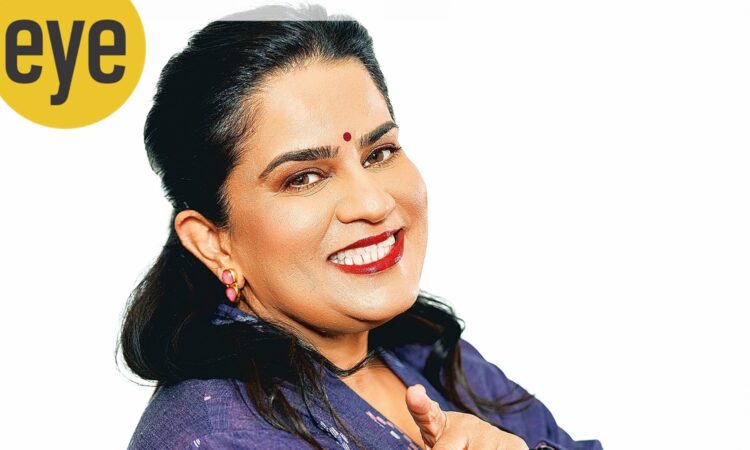Meet Zarna Garg, the Indian-American comedian who turned Indian-aunty jokes into cultural currency | Eye News

The year was 2019. Zarna Garg, a 44-year-old mother of three who had spent the last 16 years as a stay-at-home mom, made her way to an open mic in the basement of a Mexican restaurant in New York, at the insistence of her children. She had the audience in splits. She kept going back, night after night and in February 2020, she headlined her first show at Carolines on Broadway, a venue for stand-up comedy since the 1980s.
But, comedy remained a side hustle for Zarna as she tried to launch another startup — one of many that never took off. It wasn’t until 2021, when her husband Shalabh lost his high-paying Wall Street job, that the family decided to go all-in on comedy. The rest, as they say, is history. Today, Zarna Garg is a multi-hyphenate: Indian-American stand-up comic, award-winning screenwriter, The New York Times bestselling author and co-creator of a sitcom in development with Mindy Kaling and Kevin Hart.
Last week, she was in Mumbai with her children — daughter Zoya and sons Brij and Veer — spending the week socialising with the city’s who’s who, from a dinner hosted by Karan Johar to a quick chat with ‘macaron queen’ Pooja Dhingra to hanging out with comedy legend Johny Lever.
The visit was part of a promotional tour for her memoir This American Woman (Ebury Press, Penguin Random House), her stand-up special One In A Billion (now streaming on JioCinema) and a live taping of The Garg Family Podcast at Bandra’s 700-seater Bal Gandharva Rang Mandir. Tickets were priced between Rs 1,000 and Rs 7,500; the show was sold out.
As she admits in her book, Zarna is a “culturally universal loudmouthed aunty doling out home-truth bombs” who has amassed a massive fan base, both online (over 1.5 million followers on Instagram) and offline.
“When I started doing comedy, I realised there were people like me — brown stay-at-home women buried six feet under motherhood, running between lunch boxes, school, soccer and laundry,” she says. “But nobody was talking about them. So I started writing sketches about my life — about dealing with children and their anxiety, school stress, dating choices.”
Her now-famous mother-in-law jokes also emerged from this space of lived truth. “A mother-in-law saying random nonsense is a very funny thing in my life,” she says, “But when I started paying attention, I realised it’s universal — Italians joke about it, Jews joke about it, Black people joke about it. Everybody gets it. But in Indian culture, we haven’t quite crossed that line. The mother-in-law relationship is sacred. So I decided to go there.”
Story continues below this ad
She’s often asked how her mother-in-law reacts to these jokes. “She understood right away what I was doing. And when I perform, even the mothers-in-law in the audience are thinking about their mothers-in-law and not their daughters-in-law.” She adds, “We’ve undermined the intelligence of women in our culture. We assume they’ll get upset and start fighting. But women — especially Indian women — are very smart. They get it. I knew my mother-in-law would get it too.” At the Mumbai event, her mother-in-law Radha was in the audience. When she came on stage at the end, she was beaming with pride.
Over the years, Zarna has flipped stereotypes on their head and made them central to her act — from proudly wearing a bindi (which comes with a joke of its own) to her signature “uniform”: a self-designed co-ord set featuring a cotton kurta and a belt paired with pyjamas. “The belt makes me feel like I’m at work,” she says.
“If you look at the Brown people in most movies that make it to the world stage, the women are always sad — or sadder,” she says. “But in real life, everyone has a mom, an aunt or a grandmother who says crazy, random things in private. I wanted someone to show that side of us. That we’re not just self-sacrificing all the time. We laugh, we dance, we can also be bitchy.” That impulse led her to write Rearrange, a screenplay that won the top comedy feature award at the Austin Film Festival in 2019. Another project, A Nice Indian Boy, which she describes as one of the first gay South Asian rom-coms, has won multiple awards and is looking to release in India. “It’s not a coming-out story. The whole family already knows the son is gay. They want to celebrate his love but they’re over-enthusiastic and get everything hilariously wrong. It’s more of an awkward family movie.”
So, what does she think about the loudmouthed ‘Indian aunty’ persona she’s now known for? “Indian aunties may have become the butt of jokes but they’ve done the heavy lifting of keeping our culture alive,” she says. “Everything the world loves about India — chai, biryani, yoga, meditation, chicken tikka masala — who do you think kept it alive? It wasn’t the uncles. It was the Indian aunties taking care of everyone, dealing with egotistical and sad men, raising often thankless children. They’ve done the hardest jobs in society. I’m proud to own the aunty tag.” But, her first audience wasn’t Indian. “I myself didn’t fully understand stand-up comedy until then — I’d never even attended a live show. But I could tell right away: the stories were resonating. Across cultures, across the board.”
The memoir
Story continues below this ad
Not all celebrity books make for a compelling read — but Zarna’s This American Woman is an exception. She owns her story. From being neglected as a child to fleeing her privileged home at 14 to avoid an arranged marriage, surviving almost two years alone, and eventually escaping to America, Zarna tells it all. She talks about her deep bond with her step-siblings Suresh and Sunita, an almost-engagement to a glass baron, finding support in her brother-in-law, discovering love and finally, at 44, finding her calling. “Millions of people know I’m funny, they’ve seen my house, made assumptions — a lot of them true. But with this book, I wanted to tell them the story behind the story,” she says.
A Family Business
Since day one, Zarna has referred to her career as a family business. Her children have played a big role, whether it’s enacting a part in her sketches, helping promote her content on TikTok and Instagram or coming together for her podcast. “What started as me doing this and the kids helping, evolved into something much bigger, especially when I launched the podcast,” she explains, “People were constantly asking what my son, daughter or husband thought. I figured why not let them speak for themselves?”
Although Zarna is not very strict with the do’s and don’ts, she has one non-negotiable: “We don’t get mean — not to each other, not to anyone else, no matter how upset we are. We’re a voice for positivity, happiness and family joy.”





